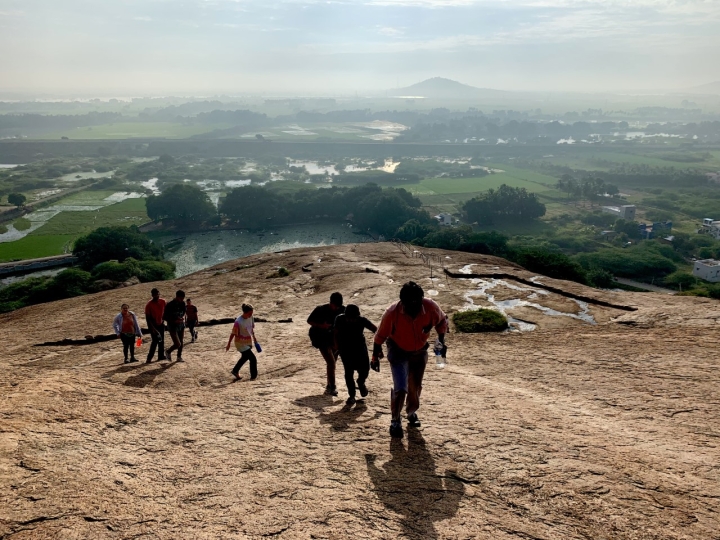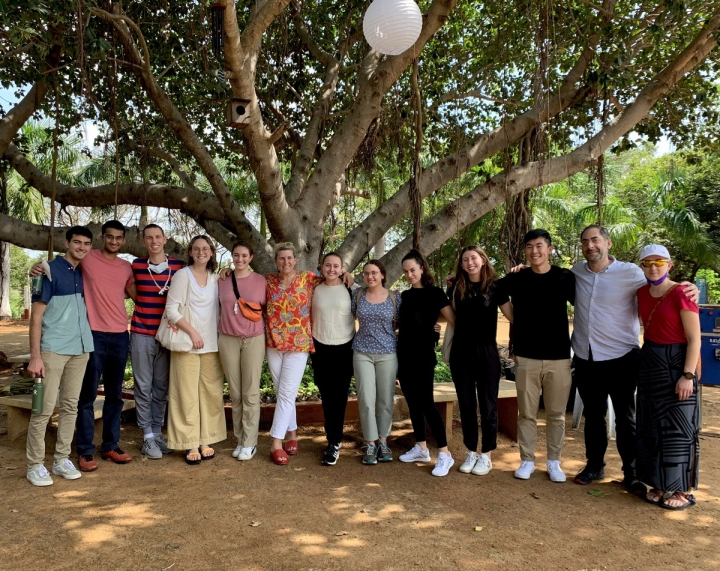Students from Biology 70: Biologic Lessons of the Eye spent eight days at the renowned Aravind Eye Hospital in Madurai, India, during winterim, where they presented original research proposals to a panel of Aravind faculty and students.
Through a series of talks and site visits, they also learned about the Aravind model of providing high-quality, high-volume eye care to patients without regard to their ability to pay. It was the third such collaboration between Aravind and Dartmouth, but the first in four years because of the COVID-19 pandemic.
Geneva Kwaku ’23, a biology major with a minor in global health, says the class and the trip were an outstanding opportunity.
“Sharing our research projects with students from the Aravind Eye Care System was an incredible experience that combined my academic interests in both biology and global health,” says Kwaku, a graduate of Hanover High School who plans to work as a research technician in an infectious diseases laboratory at Massachusetts General Hospital in Boston for a year as she applies to medical school.
“The opportunity to travel to India allowed me to learn about the workings of a successful health care system and experience the extraordinary value of scientific collaboration on the global scale,” she says.
The class is taught by Dartmouth Health ophthalmologist Michael Zegans, the Francis A. L’Esperance, Jr., MD, Visual Sciences Scholar at the Geisel School of Medicine, and Dawn Carey ’86, MED ’14, associate director of global health and development at the John Sloan Dickey Center for International Understanding.
The nine undergraduates in the class were all seniors with an interest in continuing studies in biologic, health, science, or related fields. Mark Travor, an ophthalmology resident at Dartmouth Health, and Fiona McEnany, a PhD candidate at Geisel, also assisted with the class. Both Zegans and Carey have worked with Aravind for more than a decade.
Zegans lectured each week on a different clinical example of the biology of vision, while asking his students to follow up by delving deeper into the literature on one of the eye diseases he has described and then to present their findings to the class. The final project required students to work in teams to examine the literature on one of the specific topics presented and come up with a research proposal for a question that seems to be unanswered in the existing literature.
The students presented the proposals at Aravind, the largest eye institute in the world and a center for the training of eye clinic professionals working in underserved communities around the globe. In turn, Aravind students presented their research to the Dartmouth group. The conference ended with a discussion of how to increase collaboration between Dartmouth and Aravind and how to improve the format of future meetings.
“Rather than having them acquiring and regurgitating the material, they have to work creatively with it to identify what a good project would be, how to formulate that into a hypothesis, and how to identify the materials and methods that would be needed to then turn that into a feasible research project,” Zegans says.
And by identifying questions about the biology and pathology of the eye that are ripe for research and presenting them at Aravind, the Dartmouth students are bringing something to the table, Carey says.
“Instead of students getting all the benefit, we’re asking what benefit can our undergraduates give back to our partners in the field. That part’s exciting to me,” says Carey.
The students also get to experience real-world international scientific collaboration, learning how to work in teams, and were exposed to the kind of questioning and give-and-take that will serve them well throughout their careers in science, medicine, or research, Zegans and Carey say.
Daniel Shen ’23, a biology major and a computer science minor, agrees.
“I always imagined international partnership as something that was only possible after being well-established in a field. Now I see that it is not only possible, but realistic to do these things as an undergraduate. I am looking forward to continuing to build connections with Aravind and potentially collaborating with them in the future,” says Shen, who hopes to work after graduation in the emergency department at Dartmouth Hitchcock Medical Center while continuing research with contacts at Aravind.

The nine undergraduates in the class kept a blog of their experiences in India, which also included social and cultural gatherings with Aravind students and visitors, trips to historic sites around the Tamil Nadu state of southern India, and living in the Aravind guest house, where eye health clinicians and community outreach professionals from around the world stay when visiting the center.
Staying in the Aravind guest house is, in itself, a remarkable learning experience for the students, Zegans says. “We eat in a common dining room, so you sit down with a diverse group of eye care professionals who are working to bring community eye care to places around the world and who are doing amazing work.”
He urged his students to engage fully on the trip. “One of the things that I emphasize with the students for the time there is, this is giving you a taste of what it would be like to have an international collaboration.”
Shen agrees, “I think my most significant takeaway from our trip to India is how reasonable it is to make connections and collaborate on an international scale when you are fortunate enough to be in a space where everyone lives together, eats together, and shares the same goals.”
Rachel Tiersky ’23, a biology and studio art double major who is considering medical school in the long term, says the trip made a lasting impression.
“It was so meaningful getting to spend time with the doctors and students at Aravind. Not only did we get to see them in a professional setting, but social events encouraged us to bond and exchange ideas, fostering a special sense of intercultural, interdisciplinary dialogue. The warmth and kindness shown to us by Aravind is something I will remember for a long time.”
Travel by the Bio 70 class was funded by the Francis A. L’Esperance, Jr., M.D. ’53, MED ’54 Endowed Fund for the Visual Sciences, a Dartmouth endowment established by L’Esperance, a renowned ophthalmologist and a pioneer in laser vision correction, to support activities in the visual sciences at Dartmouth.
The conference was organized in partnership with N. Venkatesh Prajna, the director of residency training and secretary of finance of the Aravind Eye Care System, and Professor K. Dharmalingam, the director of the Aravind Medical Research Foundation.
